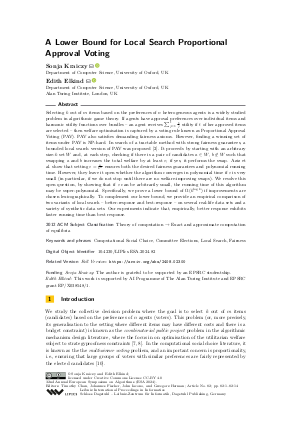A Lower Bound for Local Search Proportional Approval Voting
Authors
Sonja Kraiczy  ,
Edith Elkind
,
Edith Elkind 
-
Part of:
Volume:
32nd Annual European Symposium on Algorithms (ESA 2024)
Part of: Series: Leibniz International Proceedings in Informatics (LIPIcs)
Part of: Conference: European Symposium on Algorithms (ESA) - License:
 Creative Commons Attribution 4.0 International license
Creative Commons Attribution 4.0 International license
- Publication Date: 2024-09-23
File

PDF
LIPIcs.ESA.2024.82.pdf
- Filesize: 0.82 MB
- 14 pages
Document Identifiers
Related Versions
- Full Version https://arxiv.org/abs/2408.02300
Subject Classification
ACM Subject Classification
- Theory of computation → Exact and approximate computation of equilibria
Keywords
- Computational Social Choice
- Committee Elections
- Local Search
- Fairness
Metrics
- Access Statistics
-
Total Accesses (updated on a weekly basis)
0PDF Downloads0Metadata Views
Abstract
Selecting k out of m items based on the preferences of n heterogeneous agents is a widely studied problem in algorithmic game theory. If agents have approval preferences over individual items and harmonic utility functions over bundles - an agent receives ∑_{j = 1}^t1/j utility if t of her approved items are selected - then welfare optimisation is captured by a voting rule known as Proportional Approval Voting (PAV). PAV also satisfies demanding fairness axioms. However, finding a winning set of items under PAV is NP-hard. In search of a tractable method with strong fairness guarantees, a bounded local search version of PAV was proposed [Aziz et al., 2018]. It proceeds by starting with an arbitrary size-k set W and, at each step, checking if there is a pair of candidates a ∈ W, b ̸ ∈ W such that swapping a and b increases the total welfare by at least ε; if yes, it performs the swap. Aziz et al. show that setting ε = n/(k²) ensures both the desired fairness guarantees and polynomial running time. However, they leave it open whether the algorithm converges in polynomial time if ε is very small (in particular, if we do not stop until there are no welfare-improving swaps). We resolve this open question, by showing that if ε can be arbitrarily small, the running time of this algorithm may be super-polynomial. Specifically, we prove a lower bound of Ω(k^{log k}) if improvements are chosen lexicographically. To complement our lower bound, we provide an empirical comparison of two variants of local search - better-response and best-response - on several real-life data sets and a variety of synthetic data sets. Our experiments indicate that, empirically, better response exhibits faster running time than best response.
Cite As Get BibTex
Sonja Kraiczy and Edith Elkind. A Lower Bound for Local Search Proportional Approval Voting. In 32nd Annual European Symposium on Algorithms (ESA 2024). Leibniz International Proceedings in Informatics (LIPIcs), Volume 308, pp. 82:1-82:14, Schloss Dagstuhl – Leibniz-Zentrum für Informatik (2024)
https://doi.org/10.4230/LIPIcs.ESA.2024.82
BibTex
@InProceedings{kraiczy_et_al:LIPIcs.ESA.2024.82,
author = {Kraiczy, Sonja and Elkind, Edith},
title = {{A Lower Bound for Local Search Proportional Approval Voting}},
booktitle = {32nd Annual European Symposium on Algorithms (ESA 2024)},
pages = {82:1--82:14},
series = {Leibniz International Proceedings in Informatics (LIPIcs)},
ISBN = {978-3-95977-338-6},
ISSN = {1868-8969},
year = {2024},
volume = {308},
editor = {Chan, Timothy and Fischer, Johannes and Iacono, John and Herman, Grzegorz},
publisher = {Schloss Dagstuhl -- Leibniz-Zentrum f{\"u}r Informatik},
address = {Dagstuhl, Germany},
URL = {https://drops.dagstuhl.de/entities/document/10.4230/LIPIcs.ESA.2024.82},
URN = {urn:nbn:de:0030-drops-211538},
doi = {10.4230/LIPIcs.ESA.2024.82},
annote = {Keywords: Computational Social Choice, Committee Elections, Local Search, Fairness}
}
Author Details
Funding
- Kraiczy, Sonja: The author is grateful to be supported by an EPSRC studentship.
- Elkind, Edith: This work is supported by AI Programme of The Alan Turing Institute and EPSRC grant EP/X038548/1.
References
-
Haris Aziz, Markus Brill, Vincent Conitzer, Edith Elkind, Rupert Freeman, and Toby Walsh. Justified representation in approval-based committee voting. Social Choice and Welfare, 48(2):461-485, 2017.

-
Haris Aziz, Edith Elkind, Shenwei Huang, Martin Lackner, Luis Sánchez-Fernández, and Piotr Skowron. On the complexity of extended and proportional justified representation. In Proceedings of AAAI'18, pages 902-909, 2018.

-
Haris Aziz, Serge Gaspers, Joachim Gudmundsson, Simon Mackenzie, Nicholas Mattei, and Toby Walsh. Computational aspects of multi-winner approval voting. In Proceedings of AAMAS'15, pages 107-115, 2015.

-
Sandro Bettin, Giuseppe Molteni, and Carlo Sanna. Small values of signed harmonic sums. Comptes Rendus Mathematique, 356(11-12):1062-1074, 2018.

-
Markus Brill, Rupert Freeman, Svante Janson, and Martin Lackner. Phragmén’s voting methods and justified representation. Mathematical Programming, 203(1):47-76, 2024.

-
Markus Brill and Jannik Peters. Robust and verifiable proportionality axioms for multiwinner voting. In Proceedings of ACM EC'23, 2023.

-
Dave Buchfuhrer, Michael Schapira, and Yaron Singer. Computation and incentives in combinatorial public projects. In Proceedings of ACM EC'10, pages 33-42, 2010.

-
Shaddin Dughmi. A truthful randomized mechanism for combinatorial public projects via convex optimization. In Proceedings of ACM EC'11, pages 263-272, 2011.

-
Svante Janson. Phragmén’s and Thiele’s election methods. arXiv preprint arXiv:1611.08826, 2016.

-
Martin Lackner and Piotr Skowron. Multi-winner voting with approval preferences. Springer Nature, 2023.

-
George L Nemhauser, Laurence A Wolsey, and Marshall L Fisher. An analysis of approximations for maximizing submodular set functions - I. Mathematical Programming, 14:265-294, 1978.

-
Dominik Peters, Grzegorz Pierczyński, Nisarg Shah, and Piotr Skowron. Market-based explanations of collective decisions. In Proceedings of AAAI'21, pages 5656-5663, 2021.

-
Dominik Peters and Piotr Skowron. Proportionality and the limits of welfarism. In Proceedings of ACM EC'20, pages 793-794, 2020.

-
Luis Sánchez-Fernández, Edith Elkind, Martin Lackner, Norberto Fernández, Jesús Fisteus, Pablo Basanta Val, and Piotr Skowron. Proportional justified representation. In Proceedings of AAAI'17, pages 670-676, 2017.

-
Piotr Skowron. Proportionality degree of multiwinner rules. In Proceedings of ACM EC'21, pages 820-840, 2021.

-
Piotr Skowron, Piotr Faliszewski, and Jérôme Lang. Finding a collective set of items: From proportional multirepresentation to group recommendation. Artificial Intelligence, 241:191-216, 2016.

